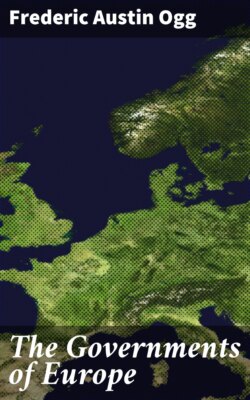Читать книгу The Governments of Europe - Frederic Austin Ogg - Страница 34
На сайте Литреса книга снята с продажи.
PARLIAMENT: THE HOUSE OF COMMONS
Оглавление79. Antiquity and Importance.—The British Parliament is at once the oldest, the most comprehensive in jurisdiction, and the most powerful among modern legislative assemblages. In structure, and to some extent in function, it is a product, as has appeared, of the Middle Ages. The term "parliament," employed originally to denote a discussion or conference, was applied officially to the Great Council in 1275;[104] and by the opening of the fourteenth century the institution which the English know to-day by that name had come clearly into existence, being then, indeed, what technically it still is—the king and the three estates of the realm, i.e., the lords spiritual, the lords temporal, and the commons. During upwards of a hundred years the three estates sat and deliberated separately. By the close of the reign of Edward III. (1327–1377), however, the bicameral principle had become fixed, and throughout the whole of its subsequent history (save during the Cromwellian era of experimentation) Parliament has comprised uninterruptedly, aside from the king, the two branches which exist at the present time, the House of Lords and the House of Commons, or, strictly, the Lords of Parliament and the Representatives of the Commons.
The range of jurisdiction which, step by step, these chambers, both separately and conjointly, have acquired has been broadened until, so far as the dominions of the British crown extend, it covers all but the whole of the domain of human government. And within this enormous expanse of political control the competence of the chambers knows, in neither theory nor fact, any restriction. "The British Parliament, … " writes Mr. Bryce, "can make and unmake any and every law, change the form of government or the succession to the crown, interfere with the course of justice, extinguish the most sacred private rights of the citizen. Between it and the people at large there is no legal distinction, because the whole plenitude of the people's rights and powers resides in it, just as if the whole nation were present within the chamber where it sits. In point of legal theory it is the nation, being the historical successor of the Folk Moot of our Teutonic forefathers. Both practically and legally, it is to-day the only and the sufficient depository of the authority of the nation; and it is therefore, within the sphere of law, irresponsible and omnipotent."[105] Whether the business in hand be constituent or legislative, whether ecclesiastical or temporal, the right of Parliament—or, more accurately "the King in Parliament"—to discuss and to dispose is indisputable.
